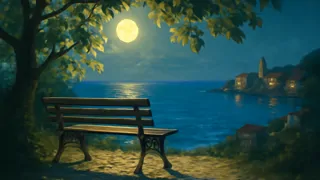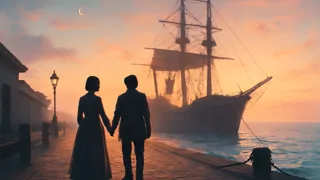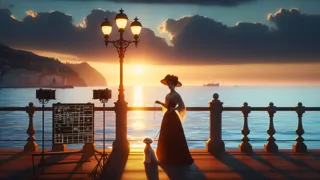Introduction
The first light of dawn stretched across the Crimean sky like a promise. White sails caught the awakening breeze, and the air smelled of salt and blooming mimosa. Anna Sergeyevna, recently arrived for a quiet seaside holiday, felt an unfamiliar flutter in her heart as she stepped onto the pebbled promenade. At fifty-two, she had grown accustomed to measured days: polite society’s endless expectations, the gentle rituals of family gatherings, and the unsaid limits placed around a widow’s life. Yet here, on this sunlit morning, she carried her small continental dog in her arms, its soft fur warm against her gloved cheek, and she allowed herself to imagine something more—something uncharted and alive.
Behind her, Yalta’s elegant villas huddled on the hillside, their verandas offering spectacular views of the sapphire sea. Gentle laughter drifted from a nearby tea house, where visitors gathered around steaming samovars, discussing the latest journal articles and exchanging polite glances. Anna found the scene both comforting and confining. She drew a steadying breath, smoothing the folds of her travel coat, and continued along the shore, letting the rhythm of lapping waves guide her steps.
As she neared a secluded stretch of beach, her dog strained at its leash, its small paws scrabbling for purchase on the cool stones. Anna paused to adjust the ribbon at its collar, and in that instant, a man emerged from the haze of morning. He carried himself with quiet purpose: dark hair tousled by the breeze, a woolen coat thrown casually over one shoulder, and a sketchbook tucked under his arm. Their eyes met, and for a heartbeat, time itself stilled. The dog barked, a sharp, delicate note, and Dmitri Gurov offered Anna a tentative nod.
No one on that promenade knew then how irrevocably their lives would change. Anna had come seeking anonymity and repose; Dmitri believed himself accomplished in the art of polite conversation and discreet liaisons. Yet in that fleeting moment—his shy good morning met by her gentle, curious smile—they discovered that chance could turn even the calmest heart into something unpredictable and unforgettable. Neither spoke as they passed; words seemed too fragile to bridge the sudden, shimmering space between them. But fate, as it often does, had begun to write its own tale.
Chance Meeting by the Black Sea
Anna continued her seaside ritual for several mornings thereafter, convinced the stranger was a mere mirage conjured by her imagination. Yet each day he appeared at the same hour, sketchbook in hand, pausing to capture the play of light on water, the rolling waves, and occasionally, Anna herself—though she never quite caught him mid-sketch. The quiet consistency of his presence unsettled her guarded heart: she felt watched, admired, but also gently understood in a way no acquaintance from home ever had.

Dmitri Gurov studied her from afar, carefully observing the thoughtful tilt of her head as she gazed at the sea, the way her dog nudged at her boots for attention. A married man accustomed to brief romances during city seasons, he had never been inclined toward permanence. Yet here, by the Black Sea, he sensed something profound. He began to practice small courtesies: offering his sketchbook for her inspection, presenting his latest charcoal drawings of local fishermen and sunlit villas. Anna, startled by his attention, found herself grateful for his kindness and intrigued by the depth in his dark eyes.
Their conversations blossomed slowly, carefully avoiding gossip and scandal. They shared opinions on Tolstoy’s latest novel and whispered theories about Pushkin’s inspiration. At first, Anna spoke in cautious phrases, as if testing whether it was safe to open her heart. Dmitri guided their dialogue with gentle curiosity, never pressing, always attentive. In that fragile space between words, they discovered a freedom neither had known: the freedom to be wholly themselves, unshackled from social expectation.
Days turned to weeks, and the seaside resort began to buzz with summer’s peak: elegant balls in grand hotel ballrooms, tea dances beneath paper lanterns, and bustling promenades thronged with fashionable visitors. Yet Anna and Dmitri found solace in hidden corners: a secluded bench beneath a grove of fig trees, a quiet terrace overlooking the sea at dusk. Under one such evening’s golden haze, Dmitri confessed that returning to Moscow, to his wife and routine, seemed suddenly impossible. Anna’s heart trembled with both fear and hope. Could she dare to imagine a life beyond duty, beyond the polite constraints of society? Their shared glance, heavy with unspoken longing, answered them both—love, once kindled, could not easily be extinguished.
Every stolen moment deepened their bond: handwritten notes passed under tablecloth folds, urgent whispered meetings framed by crashing waves, and the quiet comfort of arms entwined beneath the stars. But the world around them demanded explanation. Rumors stirred among hotel staff; Anna’s maid lodged cautious warnings about propriety. Dmitri wrestled with guilt—his family, his reputation, the life he had built loomed large. Yet none of it outweighed the brilliance he saw in Anna’s eyes or the steady rhythm of their shared heartbeat. Here, on the edge of the sea and society’s boundaries, they discovered that true love often asks for courage far beyond what one believes oneself capable of giving.
Stolen Hours and Unspoken Consequences
In the golden haze of late summer, Yalta’s resort life reached its apex. Gilded carriages rolled along the arcaded promenade, orchestras played waltzes beneath draped pavilions, and society’s elite scandalized themselves with whispered gossip. Anna and Dmitri navigated these glittering temptations with anxious grace. Each grand ball felt like a lavish stage where their secret was the only script that mattered. They wore polite smiles while their hearts pounded beneath silk and velvet.

One afternoon, Anna lingered in the hotel’s rose garden, her fingertips brushing dew-laden petals. She read Dmitri’s final letter of the week—carefully folded parchment smelling of ink and longing. His words told of nights spent staring at her portrait in his sketchbook, drawing her expression over and over as if it could bridge the distance between them. A distant brass band began to strike the opening notes of a polka, and Anna’s chest tightened. She knew each meeting carried risk: discovery would mean ruin, shame that would echo through family circles for years.
Yet in that moment, the scent of roses, the cadence of the music, and the memory of Dmitri’s tender gaze wove together into an irresistible tapestry. She rose from her seat, resolute, and made her way toward the stone archway leading to the concert lawn. There, Dmitri appeared through the shifting crowd—his coat draped casually, his sketchbook forgotten at his side. They shared a quiet smile that spoke of all the things they dared not say aloud.
They slipped away beneath the arch, hearts thrumming, to a shaded alcove where a discreet bench offered both cover and communion. Their hands met, fingers entwined, and for a precious hour, they spoke of possibility: of elopement, of homes left behind, of futures built on wild hope. Each word they exchanged thrilled with the weight of consequence. They knew the world demanded they choose: allegiance to duty or the tumultuous promise of love that defied every rule.
When the hourglass emptied and they returned to the ballroom, Anna’s cheeks burned with both fear and exhilaration. Dmitri offered his arm with a bowed greeting to the assembled guests, and none suspected the tumult beneath their calm façades. But each step toward the swirling dancers felt like walking a razor’s edge. With every pirouette and stately turn, they held their breath, wondering whether society would continue to look the other way or whether their dream would shatter like sea glass beneath a careless wave.
Choices at the Water’s Edge
As summer waned, the sea breeze turned cooler, and the resort began to prepare for its seasonal closure. Suitcases stood packed on polished floors, and farewell balls shimmered with bittersweet splendor. Anna and Dmitri sensed the end approaching with both dread and determination. They spent their final days tracing familiar paths: the cliffs above the bay where daisies grew wild, the narrow lanes lined with pastel villas, and the hidden cove where waves whispered their timeless lullaby.

One morning, before sunrise, they met at their first meeting place on the shore. The horizon glowed with pale rose and lavender, and the sea lay still beneath the sky’s reflection. They stood side by side, listening to the soft rush of water against pebbles, each acutely aware that this hour might determine the shape of all their tomorrows. Anna held her dog against her chest, its small form trembling with anticipation. Dmitri looked out to sea, then back at Anna, his voice barely more than breath: “Will you go with me?”
She felt the weight of propriety pressing on her shoulders like a heavy cloak, yet her heart surged with a fierce clarity she had never known. Memories of her quiet life in the countryside—tea-time calls, polite neighbors, dutiful family—faded beneath the urgent promise of what lay beyond. With trembling resolve, she nodded. In that moment, the sea itself seemed to hold its breath. Their clasped hands set the world in motion: an uncharted course of choices that would challenge every assumption about the life an English widow ought to lead.
They arranged passage on a small coastal steamer heading north, forging letters of explanation that spoke of health and rest rather than truth. Under the watchful eyes of morning’s first fishermen, they boarded side by side, hearts beating with equal measures of hope and trepidation. The little dog settled at Anna’s feet, as if sensing the enormity of their decision and the uncertain seas ahead.
As the vessel pulled away from Yalta’s quay, Anna pressed her hand against the railing, the wind catching her hair. Dmitri stood close, his arm steady around her waist. They watched the Black Sea recede, its gentle expanse transforming into a ribbon of memory behind them. Ahead lay uncertain waters and an unknown shore. Yet for the first time in both their lives, they moved forward together, guided by a love that had blossomed in secret and refused to be denied.
Conclusion
Beyond Yalta’s gilded promenades and moonlit alcoves, Anna and Dmitri discovered the true depth of their devotion. Their journey north was both literal and symbolic: every mile brought new challenges—whispers of scandal, abandoned fortunes, the uncertainty of starting anew in a world that prized convention above passion. Yet each hardship revealed the power of their choice. In a modest cottage far from social scrutiny, they forged a life built on shared dreams: morning coffees on a frost-kissed veranda, evenings spent by the hearth reading Russian poetry, and quiet walks through birch groves where Anna’s laughter mingled with the rustle of leaves.
They learned that forbidden love, once ignited, demands both sacrifice and courage. Dmitri wrote letters of farewell to his past, sealing them in a box of charcoal sketches he no longer needed. Anna embraced the unfamiliar rhythms of her new world, her dog at her side as steady a companion as her husband’s unwavering devotion. Together, they weathered winters of doubt and springs of renewal, discovering that love’s greatest triumph lies not in grand declarations but in the steady, shared resolve to withstand every storm.
In time, their story wore new garments: contentment, respect, and the gentle glow of memory rather than scandal. The waves of the Black Sea faded into the horizon of their recollection, but the promise born on Yalta’s shore continued to resonate in every sunrise they greeted together. Their affair—once whispered in the hush of dawn—became the foundation of a partnership that defied expectation, proving that the heart’s true journey often begins when the world demands we walk a different path.


















